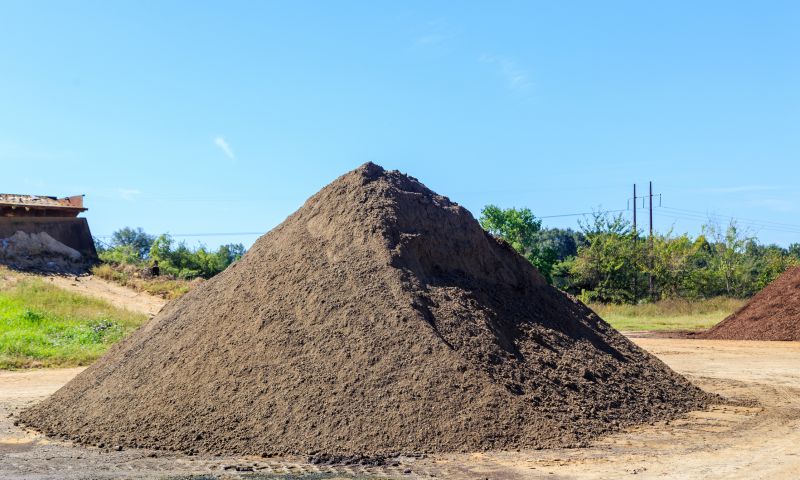Top-Rated Bulk Soil Delivery Equipment for Heavy-Duty Needs
Select from the highest-rated equipment and supplies designed to handle large soil volumes efficiently for commercial and industrial applica
 Bulk soil delivery products are essential for a variety of gardening, landscaping, and construction projects that require large quantities of soil. These products are designed to efficiently transport and distribute soil to different sites, ensuring that users can manage their projects without the hassle of sourcing soil in smaller quantities. Whether for filling garden beds, leveling land, or preparing large planting areas, bulk soil options provide a convenient solution for both professional landscapers and avid gardeners.
Bulk soil delivery products are essential for a variety of gardening, landscaping, and construction projects that require large quantities of soil. These products are designed to efficiently transport and distribute soil to different sites, ensuring that users can manage their projects without the hassle of sourcing soil in smaller quantities. Whether for filling garden beds, leveling land, or preparing large planting areas, bulk soil options provide a convenient solution for both professional landscapers and avid gardeners.
Top Overall Option
Bulk Soil Delivery Bag
A versatile and convenient option for those needing manageable quantities of soil in a portable form. These delivery bags are designed to hold substantial volumes of soil, making them suitable for various landscaping and gardening projects. They often feature durable construction to withstand handling and transportation, providing ease of use for both professionals and DIY enthusiasts.
Types of Products For Bulk Soil Deliveries
Loose Bulk Soil Loads
Delivered directly in large dump trucks or trailers, ideal for extensive landscaping or construction projects requiring large volumes.
Soil Delivery Buckets
Heavy-duty buckets or containers used for transporting soil on-site, suitable for smaller projects or precise placement.
Bulk Soil Bags
Large, durable bags designed for easy handling and transportation of soil, often used for residential or small commercial projects.
Pre-mixed Soil Blends
Specialized mixes combining soil, compost, and other amendments tailored for specific planting needs.
Soil in Totes
Intermediate-sized totes that facilitate easier handling and delivery for medium-scale projects.
Custom Soil Delivery Containers
Specialized containers designed for specific soil types or project requirements, offering flexibility in delivery.
Bulk Soil in Trailers
Transported via trailers for larger projects, providing significant volume capacity and ease of access.
Soil Delivery by Pallet
Palletized soil products for easier handling in warehouse and distribution settings.
Soil Delivery with Forklift Access
Products designed for easy offloading with forklifts, ideal for commercial sites.
Soil Delivery via Roll-off Containers
Large containers suitable for heavy-duty projects, allowing for quick and efficient soil removal or placement.
Popular Choices
Widely used for gardening and landscaping projects, available in various volume options.
Popular for enriching soil and supporting healthy plant growth in large-scale projects.
Suitable for planting beds, lawns, and garden renovations with a variety of soil mixes.
Commonly used for grading, leveling, and foundational work in construction projects.
Often delivered alongside soil for landscaping, aiding moisture retention and weed control.
Used in combination with soil for drainage improvement and construction needs.
Mixed products that combine soil and organic matter for versatile landscaping uses.
Customized mixes for specific planting or construction purposes.
Delivered in large quantities for nurseries or large container gardening projects.
Designed to promote healthy turf growth over large areas.
Used in slope stabilization and erosion prevention projects.
Locally sourced soil options tailored for specific regional planting needs.
Popular among organic gardening enthusiasts for natural cultivation.
Designed to meet the demands of athletic field construction and maintenance.
Delivered in large quantities for creating or renovating landscape beds.
Specially formulated for use in raised garden beds.
Ideal for slope stabilization and preventing soil runoff.
Used for leveling and filling large areas in construction or landscaping.
When selecting bulk soil delivery products, it is important to consider factors such as soil type, delivery method, and volume capacity. Different types of soil, including topsoil, compost, and specialty mixes, serve various purposes and can significantly impact the success of your project. Proper planning ensures that the right product is chosen to meet specific needs, whether it is for improving soil fertility, drainage, or structure.
Many bulk soil delivery options are available in various forms, including loose loads, sacks, or pre-mixed blends. Delivery methods can range from large dump trucks to smaller, more maneuverable vehicles, depending on the site accessibility and project size. Additionally, volume measurement options such as cubic yards or tons help users estimate how much soil they need, preventing over-purchasing or shortages.
Understanding the logistics involved in bulk soil delivery can help streamline project timelines and reduce costs. Coordinating delivery schedules, ensuring proper storage space, and selecting products that meet the specific requirements of your landscape or construction project are key steps. With the right products and planning, bulk soil delivery can be a highly efficient way to complete large-scale soil-related tasks effectively.
Key Buying Considerations
- Determine the specific soil type needed for your project, such as topsoil, compost, or specialty mixes.
- Assess the volume required to avoid over-purchasing or shortages, using cubic yards or tons as measurement units.
- Check delivery options and accessibility, ensuring the delivery vehicle can access your site comfortably.
- Consider the moisture content and drainage properties of the soil to match your project requirements.
- Evaluate the soil's nutrient profile if planting or gardening is involved, to support healthy plant growth.
- Review the product's origin and quality standards to ensure suitability for your application.
- Understand the handling and storage requirements for bulk soil to prevent spoilage or contamination.
- Compare delivery costs and scheduling options to align with your project timeline and budget.
- Look into any additional services offered, such as site preparation or soil mixing.
- Verify if the soil is free from debris, pests, or contaminants that could affect your project.
